

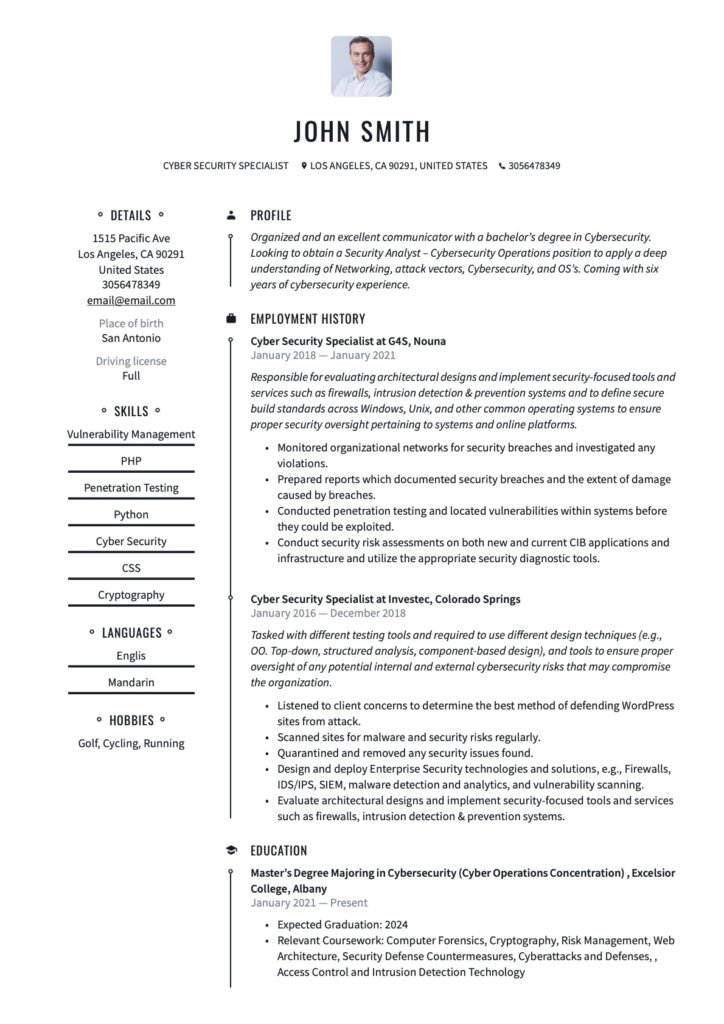
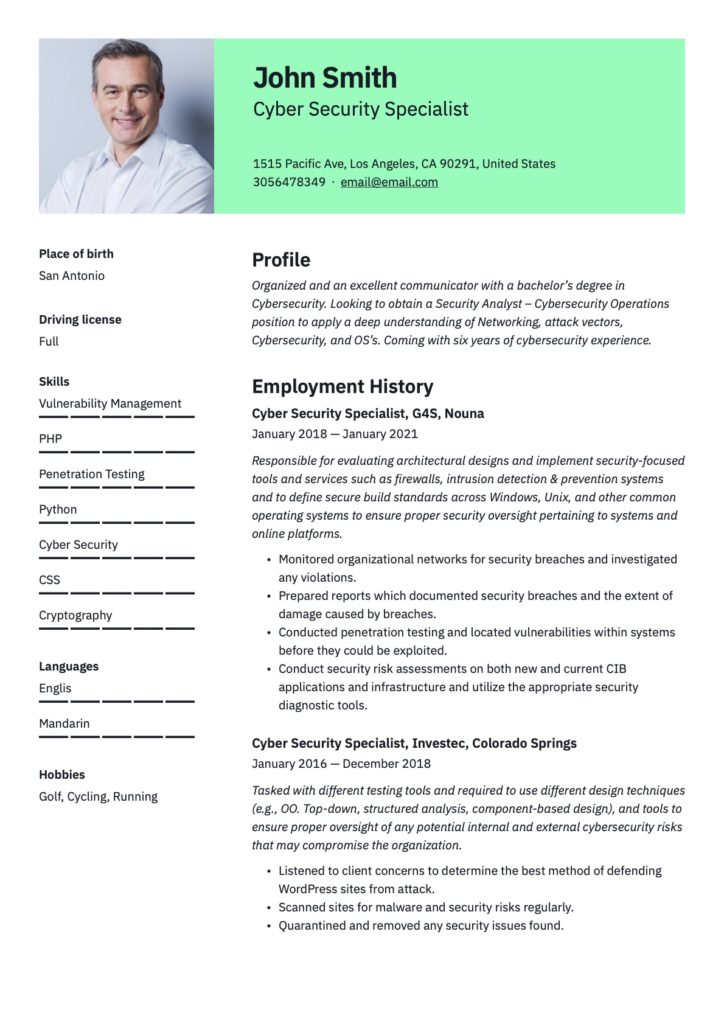
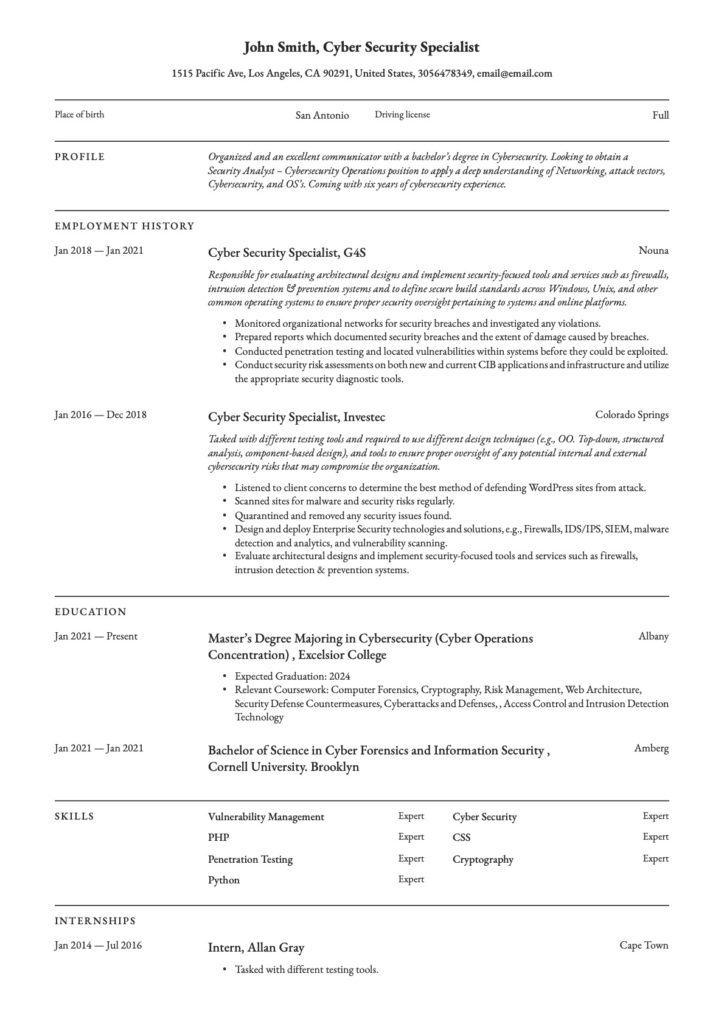
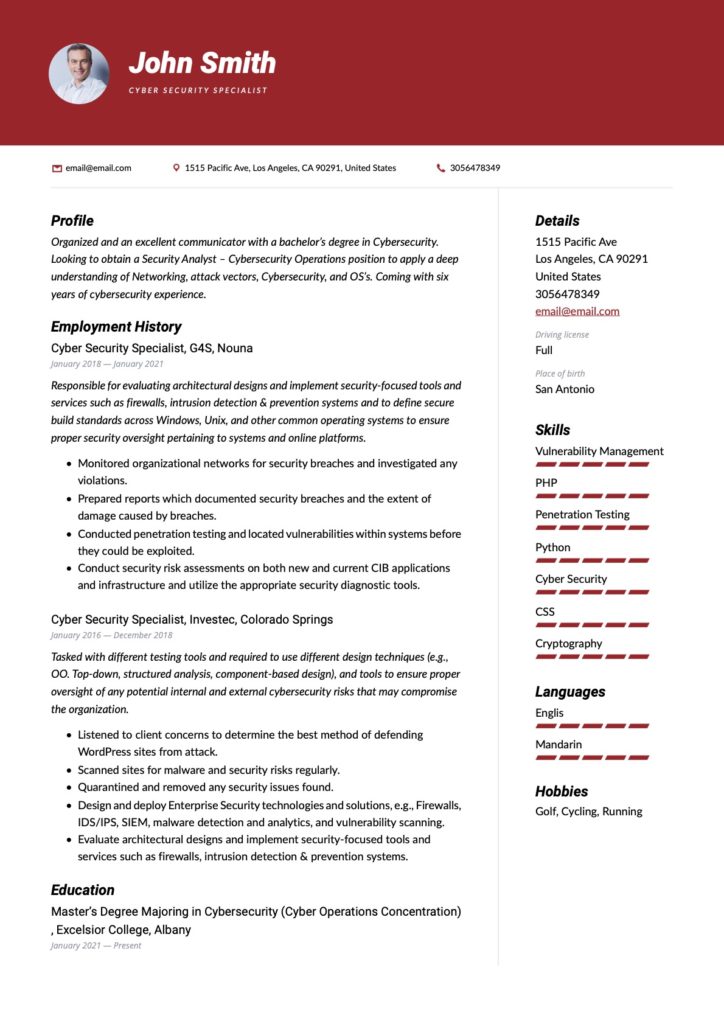
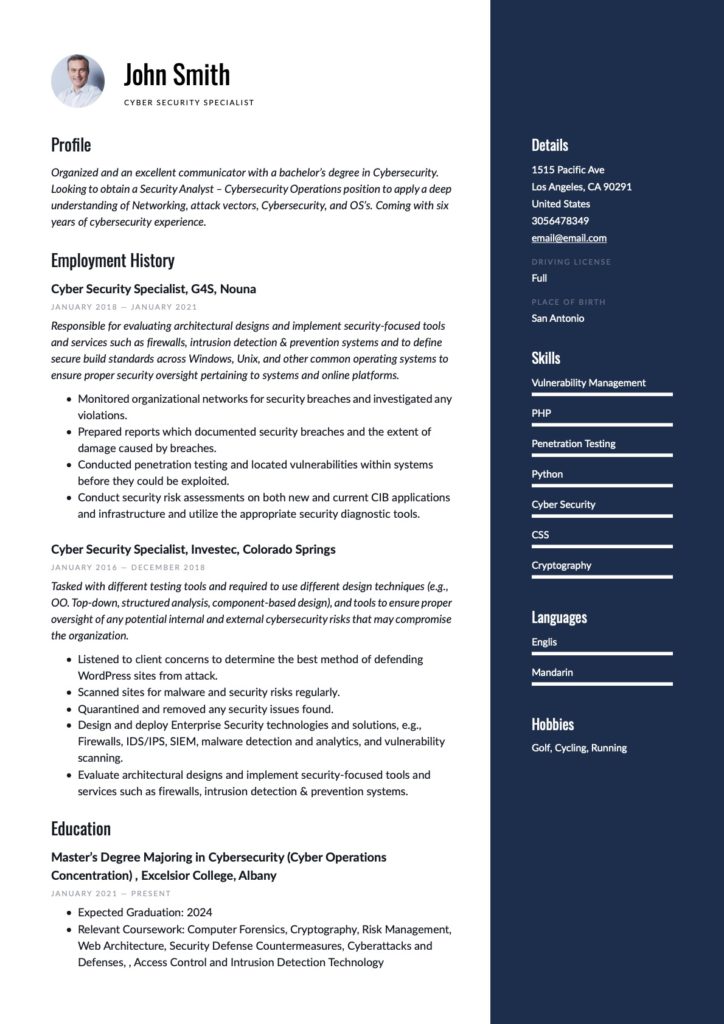
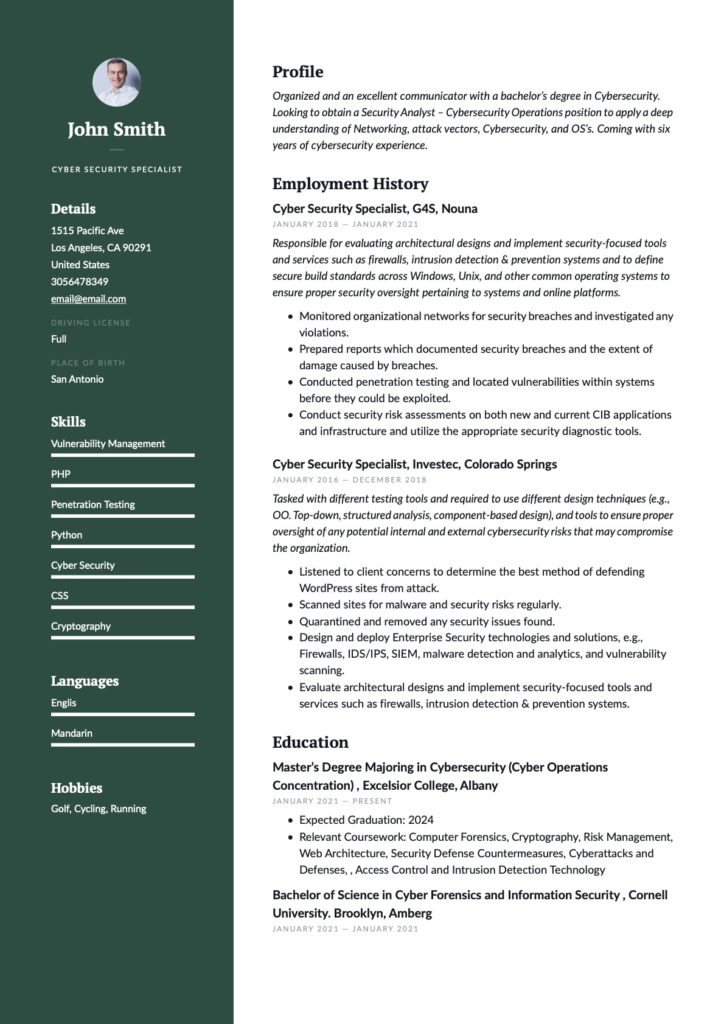
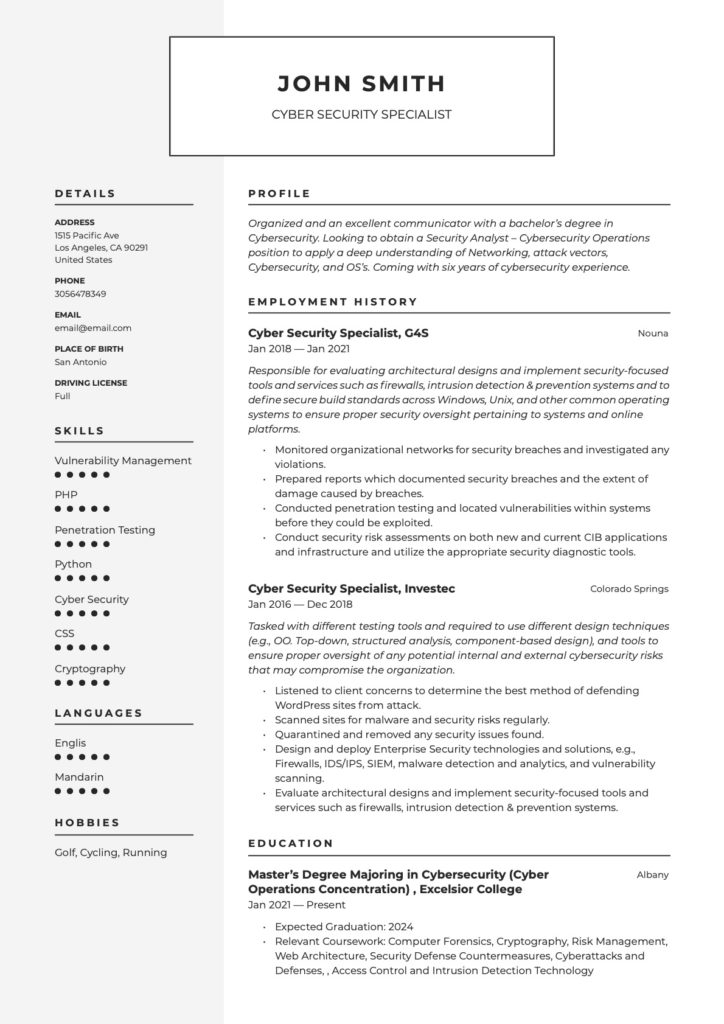
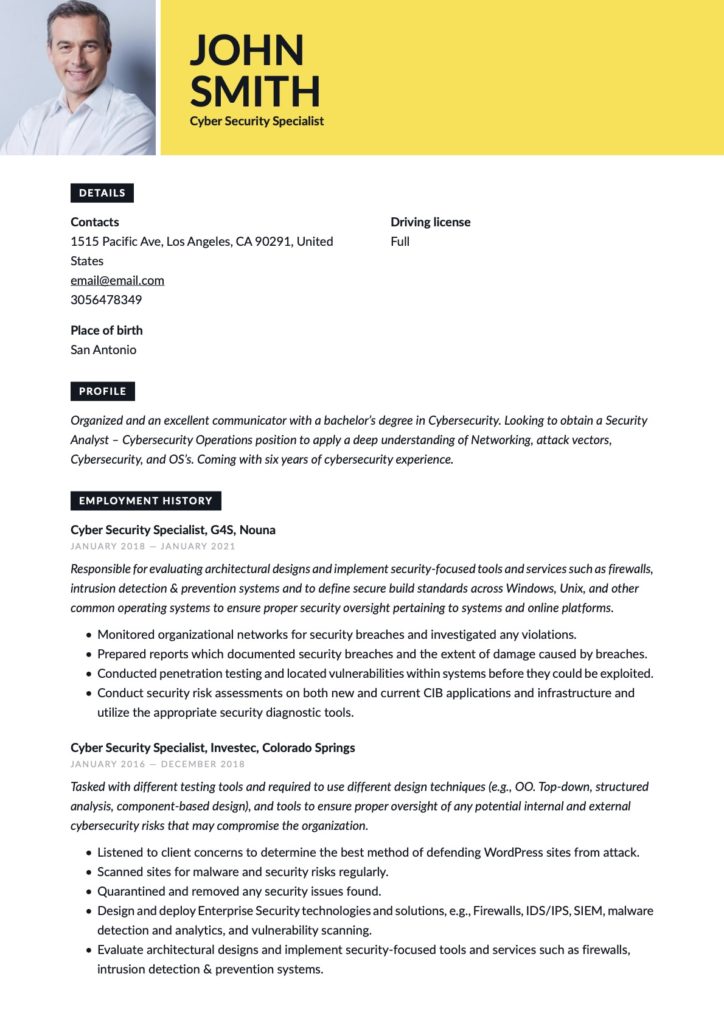

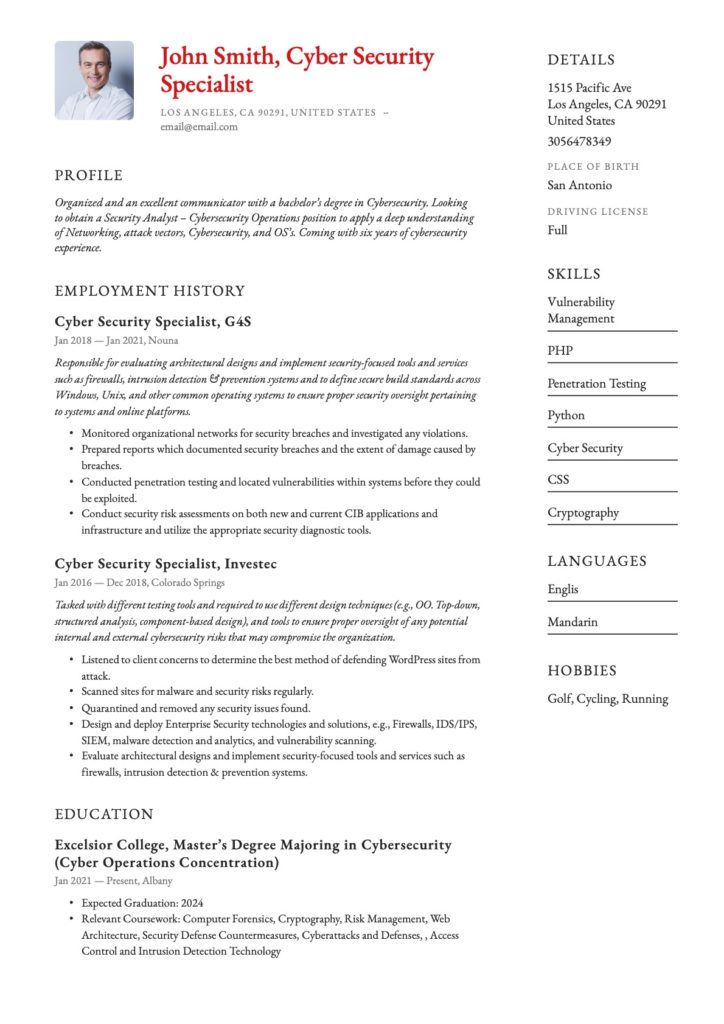
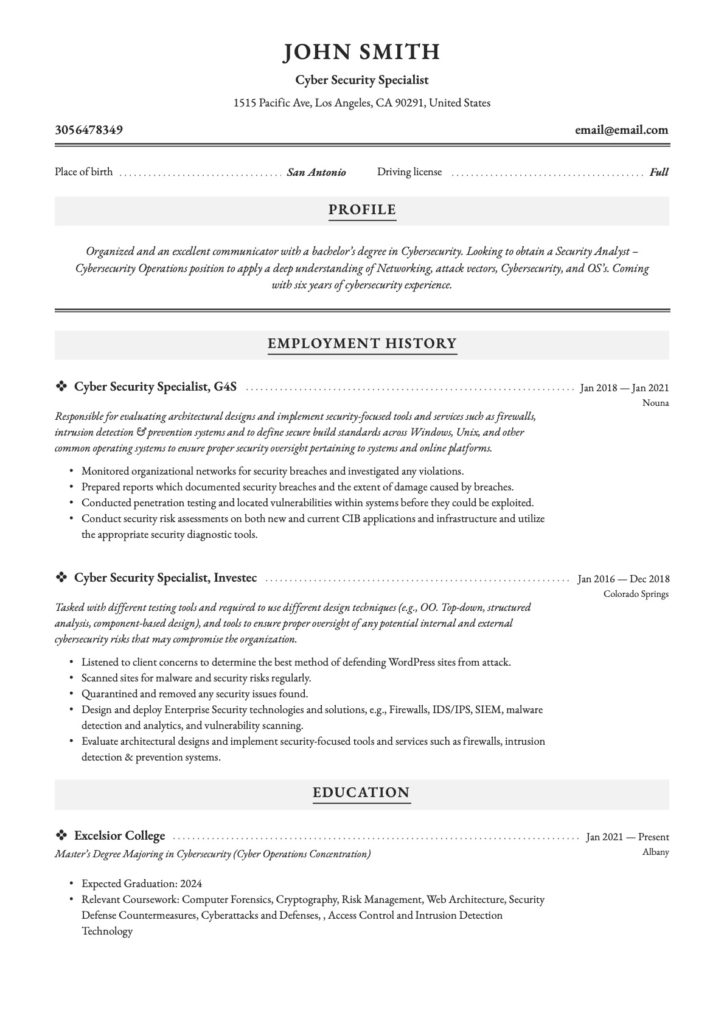
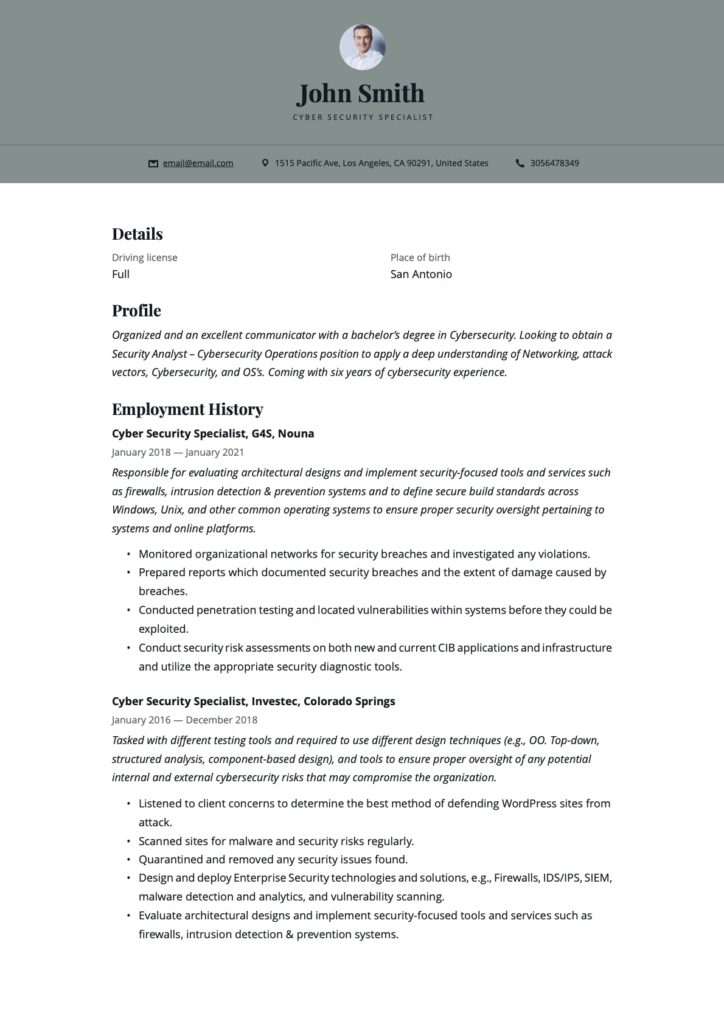
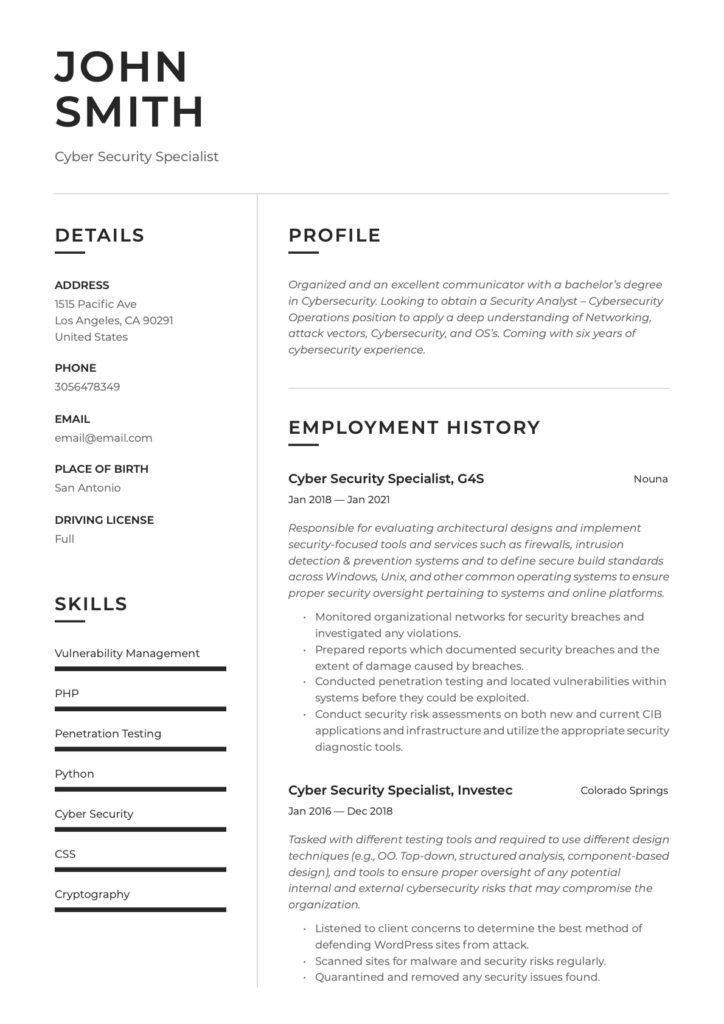
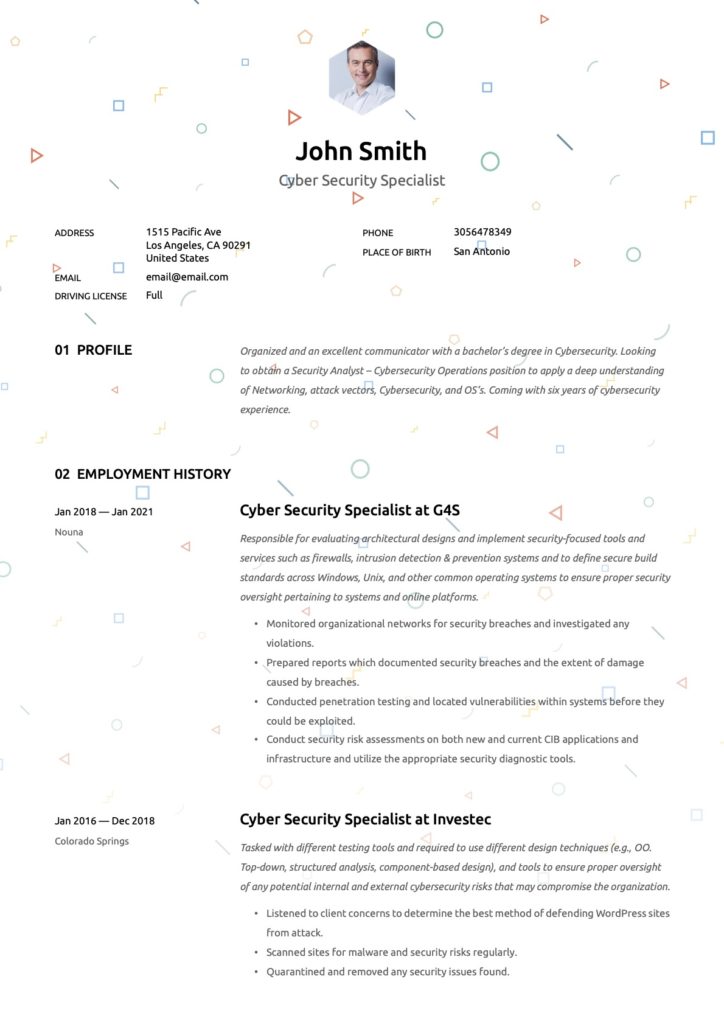


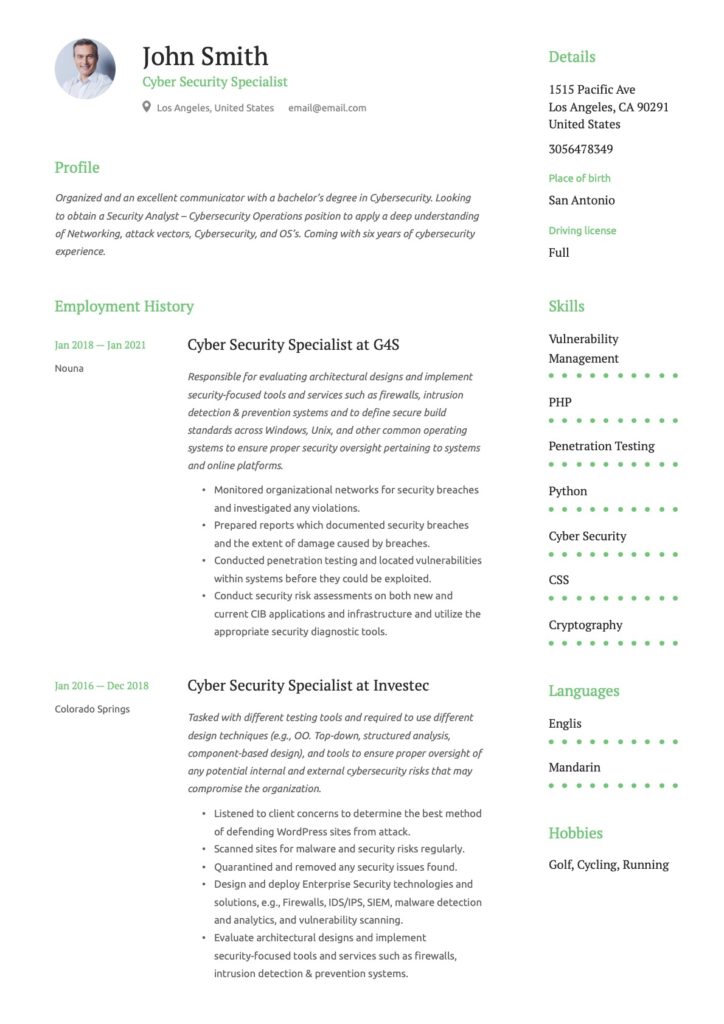
Whether you are new to the game or a seasoned Cybersecurity Specialist, you need a strong Cybersecurity resume to secure the job you want. Our Cybersecurity Resume samples will assist you in writing the perfect resume that captures any hiring manager's attention.
This cybersecurity resume guide will show you:
Hiring managers and potential employers are very busy individuals and do not have time to read every resume in absolute detail. If you do not make your most attractive information easy to find, it will likely be overlooked, and your resume will be tossed aside. Every Cybersecurity Analyst’s resume needs to include a strong list of professionally presented experience and skills. Below are examples of how this can be achieved:
When writing your experience section, remember that it is far more important to “show” rather than just “telling.” Every bullet point in your resume’s experience section needs to count. This can be achieved by mentioning the impact you had in your previous positions. Make sure a concrete example accompanies every point.
The trick to creating a capturing experience section is to select which of your experiences to include and how to order them. It is best to keep them chronological, starting with your most recent position, and working backwards. Do not include any experience that is irrelevant to this field.
Resume skills that you have not quantified are likely to get ignored and can even count against you. Focus on concrete numbers that demonstrate your ability as a Cybersecurity Analyst. So, instead of “Implemented system recovery procedures,” rather write “Implemented 200 system recovery procedures to minimize losses should an attack occur.” Resume action words such as the ones above really stand out and leave a strong impression.
A passion for learning is crucial due to how rapidly the field of Cybersecurity is evolving. This trait can be demonstrated through participation in professional conferences and career achievements that highlight show your willingness to learn and improve.
A Cybersecurity resume may have certain generic sections to every resume you write. However, this is not one of those sections. You should rewrite this section for every resume you create and tailor it to reflect exactly what the job description is looking for.
More often than not, potential employers want to see that you have the basic skills needed to handle Cybersecurity Specializing work. The easiest way to impress them from the start is by opening your application with a well-written Cybersecurity Specialist resume summary.
This section is placed at the top of your resume to provide a quick, digestible overview of your most valuable skills as a Cybersecurity Specialist. Employers love this, as it saves them the time of searching through your resume looking for the information they need. This means that you need to grab their attention from the very beginning to ensure they keep reading. Adding hard numbers will add further valuable proof to your statements.
Alternatively, a Cybersecurity Specialist’s resume objective brings your skills to the foreground and allows the recruiter to see why you are the perfect candidate. Resume objectives work best for applicants with limited professional experience. An objective statement in an entry-level cybersecurity resume tells the agency your career goals. Like the summary, use relevant experience, skills, and achievements to beef it up.
“Persistent, detail-oriented cybersecurity analyst with 4+ years’ experience with government security software contractor. DoD security clearance. Identified the 2017 Kluxnet virus, saving over 32,000 computers from destruction.”
“University IT graduate with cybersecurity background and hundreds of classroom hours in automation, cloud safety, and digital forensics. Looking to leverage my newly minted top-secret security clearance and 4.0 GPA to become the next network security engineer at Astoria Tech.“
“A talented individual with an information technology background. A strong desire to grow technical skills and the ability to learn new technologies swiftly. Hopeful for a Cybersecurity Analyst position at Boeing, coming with a 2year internship experience, superb communication aptitude, and proficiency in all Microsoft Office tools, as well as high attention to detail.”
“Organized and an excellent communicator with a bachelor’s degree in Cybersecurity. Looking to obtain a Security Analyst – Cybersecurity Operations position to apply a deep understanding of Networking, attack vectors, Cybersecurity, and OS’s. Coming with six years of cybersecurity experience.”
Resume Hack: On any cybersecurity resume, the resume objective or summary goes at the top. However, it does not mean that you must write it first! Save it for the end, so you have the rest of your resume to support your heading statement.
Information Security Analysts and Cybersecurity jobs in the US will grow by a whopping 29% between 2019–2029. That is more than 29,000 new people for you to compete against. You, therefore, need to ensure that your resume is in a class of its own. Below are examples of how you can really make your resume stand out:
February 2017 – December 2022
February 2014 – January 2017
Cybersecurity Specialists are found in almost every industry imaginable, with considerable variation in their role purposes and KPI’s. Despite this, employers look for and expect specific skills and qualities from applicants.
As a Cybersecurity Specialist, your success is often measured in data. Therefore, it is crucial to add hard numbers to your resume to quantify your accomplishments and provide much-needed authentication. Adding concrete numbers to your resume helps further illustrate your accomplishments to potential employers. Any networks you have created or any teams you have trained are examples of information you can include in your resume. Tell them what you are proud of.
This section is where you can really impress the reader. Wherever you can quantify your accomplishments and provided evidence of your hard work, it may be impossible to quantify every statement; however, we will show how you maintain a high standard.
Below are examples of FLAT, BORING, and BLAND statements which is not the aim:
Now let’s crack it up a notch!
Most employers spend a considerable amount of time reading through this section, and it can often be the make or break between you landing an interview or not. It may not be the largest section, but it is vitally important to correctly list all the information.
If you graduated within the last three to five years, make sure your education section is either in line with or above your experience section. Include the date you graduated or the range of years you were at school as well as any honors you received and your GPA, if it was over 3.4.
If you have multiple advanced degrees, such as a master’s or Doctoral degree, rank them with the highest degree first. If it has been longer than five years since you graduated, it is better to list your experience above your education section. You really want the reader to focus on your extensive experience.
If you have not graduated, or never will, still include an education section. Simply list the name of the institution, degree type, and when you are expecting to graduate. Hiring managers typically identity management systems—if you do not have the right permissions, a passage will not be given.
Expected Graduation: 2021 – Master’s Degree Majoring in Cybersecurity (Cyber Operations Concentration) Excelsior College, Albany, NY
Relevant Coursework: Computer Forensics, Cryptography, Risk Management, Web Architecture, Security Defense Countermeasures, Cyberattacks and Defenses, , Access Control and Intrusion Detection Technology
2016-2018 – BS in Cyber Forensics and Information Security at Cornell University. Brooklyn, NY
Relevant Coursework:, Cyber Crime, Database Security, Ethical Hacking, Vulnerability Analysis, National Security, Malware Analysis, Network Intrusion Detection, Penetration Testing, Network Forensics
In most cases, your resume will be passed through an Automated Tracking System (ATS), which will scan your resume for specific keywords. To ensure that the system shortlists your resume, you need to include keywords from the job description. This will guarantee that the AtS will highlight your resume, and it is more likely to be seen by an actual person.
When listing your skills, refrain from mentioning any skills that are not relevant to the field. Furthermore, soft skills are just as important as hard skills, be sure to add them so that the reader can form a good idea of what type of employee you will be.
Below, we have given examples of how to list your skills on a Cybersecurity resume:
Make a list of all the programming languages, database management technologies, and other technical skills you have had experience with. A Skills Matrix is a smart approach to combining technical and interpersonal skills in an organized, attractive manner.
| Technical Competencies | Interpersonal Traits | Domains |
| Data Analytics | Time Management | Data Security & Information Lifecycle Mgmt |
| Programming | Accountability | Datacenter Security |
| Cloud Security | Interpersonal Skills | Encryption & Key Mgmt |
| Encryption | Works Well Under Pressure | Governance & Risk Mgmt |
| Malware Analysis | Communication Skills | App & Interface Security |
| Risk Analysis | Attention to Detail | Audit Assurance & Compliance |
| Python Scripting | Problem-Solving | Business Continuity Mgmt & Operational Resilience |
| Intrusion Detection | Collaboration & Teamwork | Change Control & Configuration |
| Secure Software Development | Time Management | Security Incident Mgmt, E-Discovery & Cloud Forensics |
| Incident Response | Management Skills | Supply Chain Mgmt, Transparency & Accountability |
| SIEM Tools | Computer Skills | Threat & Vulnerability Mgmt |
| Secure Software Development | Critical Thinking | Identity & Access Mgmt |
| Automation/DevOps | Decision Making | Infrastructure & Virtualization |
| Security Analysis | Technical Skills | Interoperability & Portability |
| Risk Mitigation | Analytical and Diagnostic Skills | Mobile Security |
| Certified Information Security Manager (CISM) | CompTIA Cybersecurity Analyst (CySA+) | Certified Ethical Hacker (CEH) |
| CompTIA Advanced Security Practitioner (CASP+) | CompTIA Penetration Tester (PenTest+) | Certified Information Systems Security Professional (CISSP) |
| SANS GIAC Security Essentials (GSEC) | Offensive Security Certified Professional (OSCP) | Bachelors Degree in Computer Science |
Downloads are in Pdf-file format, and free. The examples have been made with the resume builder of Resume.io,accessible trough the blue ‘Create My Resume' buttons below. The tool lets you download all template designs from one master document. They have a free cover letter builder as well, that combines the resume formats. One free download is included for every sign up from our page!